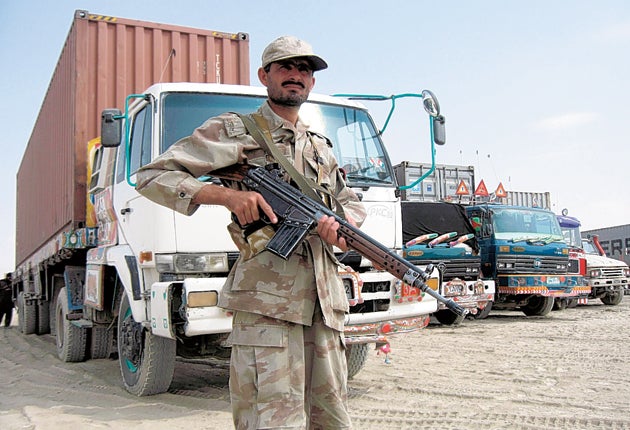British brothers 'behind plot to terrorise Europe'
Pakistani sources say extremists planning Mumbai-style attacks had domestic links

Two British brothers based in Pakistan were at the heart of a plot to launch "Mumbai-style" terrorist attacks in Britain and other European countries, it was claimed yesterday.
One of the men, named as Abdul Jabbar, was killed earlier this month in a missile strike by an unmanned American drone as part of a series of attacks directly aimed at the organisers of the plan to stage co-ordinated killing sprees by groups of commandos in major European cities.
A Pakistani intelligence official said the two Britons had been tracked for nearly a year in North Waziristan, a lawless tribal region which has become a hub for Islamist militants, along with eight German citizens who were also involved with the al-Qa'ida-linked plot.
The men had been making phone calls to London and Germany to begin the process of activating the plot by finding accomplices in Europe, the official said. Western security sources said on Wednesday that the scheme had recently moved from being an aspiration to concrete planning and was "still active".
The Pakistani official, part of the team in charge of tracking the suspects, told the Associated Press: "They have been making calls to Germany and London. They have been talking about and looking for facilitators and logistics they need there to carry out terror attacks."
Intelligence on the plot first emerged late this summer following the arrest of a German national, Ahmed Sidiqui, 36, who was detained in Kabul in July and provided American interrogators with details of an attack on Britain, France and Germany being planned from Waziristan.
The information provided by Sidiqui was closely linked to a sharp rise in CIA drone attacks in the region last month aimed at disrupting the organisers of the plot, which was designed to mimic the bloody assault on Mumbai in 2008 by 10 Pakistani terrorists who killed nearly 170 people in a three-day rampage.
Jabbar, who was believed to be less than 30 years old and who came from the Jhelum district in northern Pakistan, was killed on 8 September in one of 21 US missile strikes – the highest number of attacks in a single month in six years. The Foreign Office declined to give details on the death of the Briton, saying it did not discuss security matters. The fate of his brother is unknown.
Although Western security sources described the plot as "embryonic" and said attackers had not yet travelled to Europe, the Pakistani official warned against underestimating the suspects, who he said were acting with the support of al-Qa'ida and the Taliban in Pakistan and Afghanistan. The official said: "It does not mean that they are not capable of materialising their designs. They are very much working on it."
Counter-terrorism officials said the disclosure of the Mumbai-style plot proved that the threat from Islamist groups remained high.
Robert Wainwright, the director of Europol, the European police agency, said: "There has been a significant decline in the number of terrorist attacks in Europe – certainly committed by Islamist groups – that hides the reality that these groups are still active. The threat is still out there – absolutely – as these reports show."
The escalation of attacks in Pakistan by American and allied forces sparked renewed strains between Islamabad and Western governments yesterday.
Pakistan announced it was blocking the supply routes for Nato forces in Afghanistan after it emerged that Nato helicopters pursuing militants in Afghanistan entered Pakistani airspace this week and fired on a group of suspects.
Pakistani military officials said the aircraft had actually attacked one of their border checkpoints, killing three soldiers and injuring three others, after the troops fired warning shots to show the helicopters were entering Pakistan.
It was unclear whether the closure of the Nato supply routes was a direct retaliation for the incident but Rehman Malik, Pakistan's interior minister, said that as a result of the border incursion "we will have to see whether we are allies or enemies".
Join our commenting forum
Join thought-provoking conversations, follow other Independent readers and see their replies
Comments
Bookmark popover
Removed from bookmarks